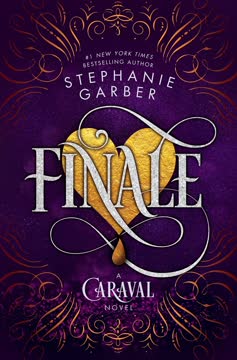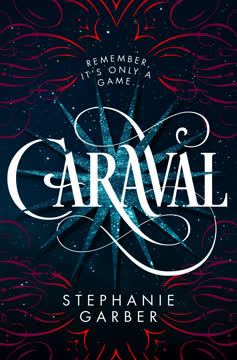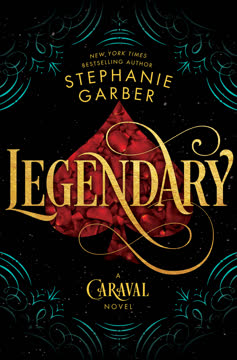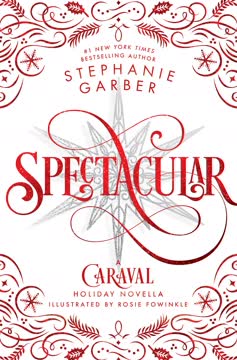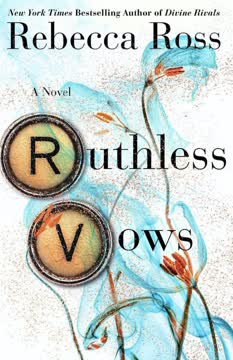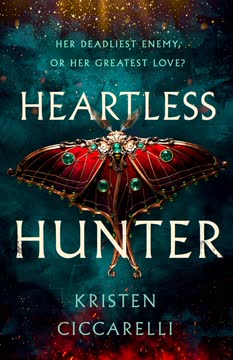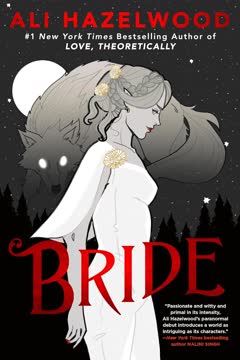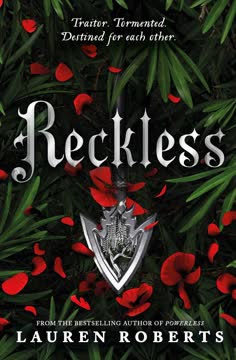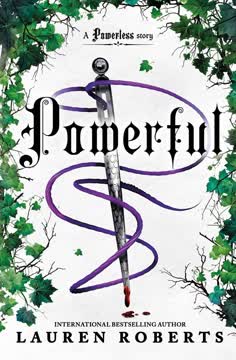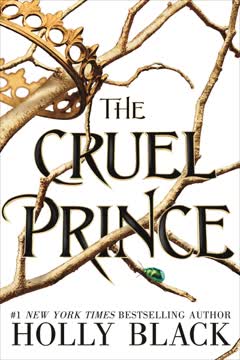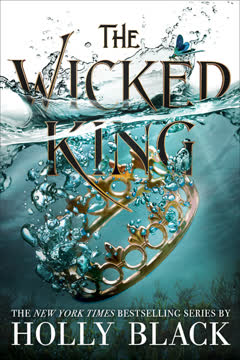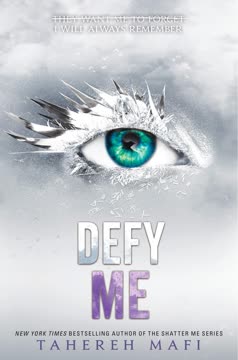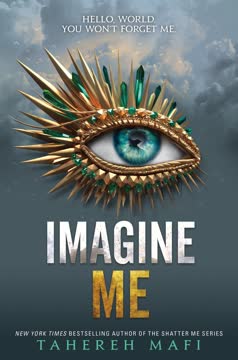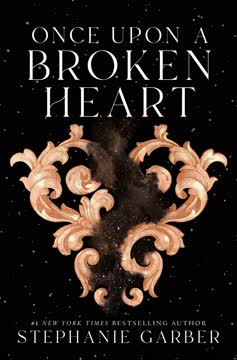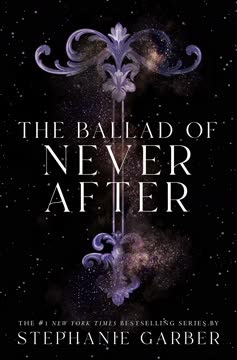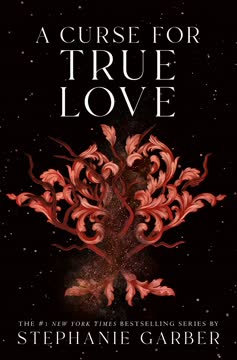Plot Summary
Sisters and Crowns Shattered
Scarlett and Donatella Dragna, sisters bound by love and trauma, have survived the magical, deadly game of Caraval. But the aftermath is chaos: Legend, the enigmatic master of Caraval, has claimed the throne of the empire, and the sisters' mother, Paloma, remains in an enchanted sleep. Tella is haunted by dreams of Legend, torn between desire and distrust, while Scarlett seeks control over her own fate, challenging her suitors to a contest for her hand. The sisters' bond is tested as they each pursue their own dangerous paths, unaware that the past—especially their mother's—will soon threaten everything they hold dear.
Dreams, Lies, and Legend
Tella is visited nightly in her dreams by Legend, who blurs the line between illusion and truth. Their encounters are charged with longing, pain, and the unresolved tension of their past sacrifices. Legend's magic is faltering, and Tella senses something is deeply wrong. She is drawn to him, yet refuses to be just another girl in his story. The dreams become a battleground for control, desire, and the hope for something real, even as the world outside grows more perilous.
The Game After Caraval
Scarlett, determined to seize her own destiny, orchestrates a competition between her former fiancé, Nicolas, and Julian, the man who truly holds her heart. The winner will claim her hand in marriage. This game is Scarlett's attempt to reclaim agency, but it quickly becomes entangled with the larger, more dangerous games at play in the empire. Her choices, and the men's rivalry, echo the manipulations and illusions of Caraval, but with real stakes and consequences.
The Deck Unleashed
The magical Deck of Destiny, once thought to be mere myth, is now a reality. Its immortal beings—Destinies—are freed, bringing chaos and terror to the empire. These ancient, godlike figures feed on fear and manipulate fate, threatening not just the sisters but the entire world. Their awakening is tied to the secrets of the Dragna family, and the sisters must confront the consequences of their mother's past actions and their own choices.
Sisters' Separate Gambits
Scarlett is drawn into the web of her own contest, while Tella, desperate to save Legend and her mother, seeks answers in forbidden places. Their paths diverge: Scarlett faces the ghosts of her mother's choices and her own heart, while Tella chases after Legend, uncovering the truth about his magic, his origins, and the cost of loving an immortal. Both sisters are forced to confront what they are willing to sacrifice for love and family.
The Price of Magic
Legend's magic, once limitless, is now failing. He seeks help from Esmeralda, the witch who made him, and learns that the Destinies' immortality is tied to the one who created them: the Fallen Star. To destroy the Destinies, the Fallen Star must die—but he shares the same fatal weakness as Legend. Tella witnesses Legend's ruthless side as he betrays Esmeralda to regain power, forcing her to question whether he can ever truly love or be trusted.
The Mother's Secret Past
The sisters' mother, Paloma, awakens only to vanish, leaving behind a warning: the Destinies are awake, and the sisters are in grave danger. Tella pursues her, only to witness Paloma's tragic reunion with Gavriel, the Fallen Star—her former lover and the creator of the Destinies. In a fatal confrontation, Paloma tries to kill Gavriel, but is slain instead. Tella is left shattered, her mother's secrets now a deadly inheritance.
The Destined Threat Awakens
With the Destinies unleashed, Valenda descends into terror. People are petrified, manipulated, and killed in cruel games. The Destinies' power grows as fear spreads, and the sisters realize that defeating them will require more than courage—it will demand impossible choices and the unraveling of ancient magic. The empire teeters on the brink, and the sisters must rally unlikely allies to stand against the immortal threat.
Love's Deadly Bargain
Tella's grief and desperation lead her into a dangerous alliance with Jacks, the Prince of Hearts, who claims her as his true love. Their bond is sealed in blood, binding Tella to him in a marriage of magic and obsession. Meanwhile, Legend offers Tella immortality, but not love—he cannot risk loving her, for love is the only thing that can make an immortal vulnerable. Tella must choose between a love that could destroy Legend and a devotion that could destroy herself.
The Contest for Scarlett's Heart
Scarlett's contest between Julian and Nicolas becomes a crucible for her own heart. As the Destinies close in, Scarlett is forced to confront her lineage—she is the daughter of the Fallen Star, and her powers are awakening. To save those she loves, Scarlett must master her abilities, face her father, and make a sacrifice that could cost her everything. Her journey is one of self-discovery, forgiveness, and the realization that true power lies in vulnerability and love.
The Fate of Legend
Legend is captured and caged by the Destinies, his immortality at risk. Tella, under Jacks's spell, nearly loses herself, but the power of true love breaks the enchantment. Legend, finally able to admit his feelings, chooses love over immortality, risking everything to be with Tella. Their union is hard-won, forged in sacrifice and the acceptance of mortality. The fate of Legend is a testament to the transformative power of love.
The Market of Secrets
Desperate for a way to defeat the Fallen Star, Tella ventures into the Market of Secrets, a magical place where everything has a price. She trades a secret about her future child for knowledge of the Fallen Star's weakness, learning that only love can make an immortal mortal. The cost of this knowledge is high, binding Tella to a future she cannot fully control, and setting the stage for the final confrontation.
The Blood Price Paid
Scarlett, realizing that only by becoming what her father desires can she defeat him, travels back in time to learn from her mother, Paradise. She returns with the strength and knowledge to face the Fallen Star, but the final battle demands a blood price. Scarlett's willingness to forgive and show compassion, even to her monstrous father, becomes the key to breaking the cycle of violence and fear.
The Immortal's Weakness
The sisters discover that the only way to kill the Fallen Star—and by extension, the Destinies—is to make him love, for love renders an immortal mortal. Scarlett, embodying her mother, confronts her father and offers forgiveness. In a moment of vulnerability, the Fallen Star becomes human, and Tella delivers the fatal blow. The power of love, both as a weapon and a healing force, is revealed as the true magic of the story.
The Trap of Obsession
Jacks's obsession with Tella nearly destroys her, binding her in a marriage of magic and manipulation. But Tella's strength and the love she shares with Legend break the spell. Jacks is left alone, a cautionary figure of what happens when love becomes possession. Tella's journey is one of reclaiming her agency, choosing love freely, and refusing to be anyone's pawn.
The Final Coronation
With the Destinies defeated and the empire saved, Scarlett is crowned Empress, ushering in a new era of hope and healing. She chooses Julian, not out of obligation, but out of true love. The sisters, once pawns in others' games, are now the authors of their own destinies. Their triumph is bittersweet, marked by loss, but also by the promise of new beginnings.
Sacrifice and True Endings
The sisters reflect on the nature of endings—how true endings require sacrifice, hope, and the courage to keep going when all seems lost. Not everyone gets a true ending, but those who persevere, who choose love and forgiveness over fear and vengeance, can find one. The story closes with the sisters united, their bond unbreakable, and the world forever changed by their choices.
A New Dynasty Dawns
Scarlett's coronation marks the start of a new dynasty, one built on love, resilience, and the lessons of the past. Tella, ever restless, seeks new adventures, while Legend, now mortal, chooses a life with her. The empire is free from the tyranny of the Destinies, and the sisters, once at the mercy of fate, are now its masters. Their story is a celebration of hope, the power of choice, and the magic that lives in every heart willing to love.
Characters
Donatella (Tella) Dragna
Tella is the younger Dragna sister, impulsive, passionate, and driven by a need to protect those she loves—even at great personal cost. Her relationship with Legend is a tumultuous dance of desire, mistrust, and longing for something real. Tella's journey is one of self-discovery: she is tempted by power, tested by grief, and nearly destroyed by obsession, but ultimately chooses love freely. Her bond with her sister is her anchor, and her willingness to sacrifice for family and hope is the heart of the story.
Scarlett Dragna
Scarlett, the elder sister, is cautious, nurturing, and determined to control her own fate. Her contest between Julian and Nicolas is a microcosm of her struggle to choose for herself. Scarlett's arc is one of transformation: from a girl ruled by fear to a woman who embraces her power, forgives her mother, and faces her monstrous father. Her love for Julian is steadfast, and her ultimate act of forgiveness and compassion is what saves the empire.
Legend (Dante)
Legend is the immortal master of Caraval, a man of illusions, secrets, and impossible choices. His magic is both a gift and a curse, and his fear of love is rooted in the knowledge that it is his only weakness. Legend's journey is one of vulnerability: he must choose between immortality and love, and in choosing Tella, he becomes truly human. His transformation is the story's emotional climax, proving that love is the greatest magic of all.
Jacks (Prince of Hearts)
Jacks is a Destined immortal, the Prince of Hearts, whose love is more obsession than devotion. He is both ally and antagonist, helping Tella but binding her to him in a marriage of magic. Jacks's inability to truly love makes him a cautionary figure, a warning of what happens when desire becomes possession. His arc is one of longing and loss, forever on the outside of true love.
Scarlett and Tella's Mother (Paloma/Paradise)
Paloma, also known as Paradise, is the sisters' mother and the key to the Destinies' past. Her love affair with Gavriel, the Fallen Star, sets the events of the story in motion. Paloma's choices are driven by love and fear, and her ultimate sacrifice is both a warning and a legacy for her daughters. Her story is a reminder that the past is never truly gone, and that love can be both a weapon and a shield.
Gavriel (The Fallen Star)
Gavriel is the creator of the Destinies, the immortal Fallen Star, and Scarlett's biological father. His love for Paradise is his undoing, and his fear of love's power drives him to cruelty. Gavriel is both villain and victim, a being who cannot escape the consequences of his own heart. His death is the end of the Destinies' reign and the beginning of a new era.
Julian
Julian is Legend's brother and Scarlett's true love. He is steadfast, brave, and willing to risk everything for Scarlett. His journey is one of redemption, proving that love is not about possession but about sacrifice and trust. Julian's loyalty and courage are a counterpoint to Legend's fear and Jacks's obsession.
Esmeralda
Esmeralda is the witch who gave Legend his powers and imprisoned the Destinies. She is both mentor and victim, her fate a warning about the dangers of power and betrayal. Her relationship with Legend is complex, marked by mutual need and ultimate betrayal.
The Destinies
The Destinies are ancient beings of magic, each with their own powers and agendas. They are both gods and monsters, feeding on fear and manipulating fate. Their awakening is the catalyst for the story's central conflict, and their defeat is a testament to the power of hope and love.
The Asesino (The Assassin)
The Asesino is a Destined with the power to travel through time and space. His madness is a result of his abilities, and his allegiance is uncertain. He is both a threat and a tool, helping Scarlett in her final gambit to defeat the Fallen Star.
Plot Devices
Dual Narrative Structure
The story is told through the alternating perspectives of Scarlett and Tella, allowing readers to experience the world through both sisters' eyes. This structure heightens the emotional stakes, as each sister's journey mirrors and contrasts the other's. Their separate quests, choices, and sacrifices converge in the final act, underscoring the power of family and the necessity of hope.
Magical Realism and Illusion
Magic in Finale is both wondrous and treacherous. Illusions, dreams, and enchanted objects create a world where nothing is as it seems. This blurring of reality and fantasy forces characters—and readers—to question what is real, who can be trusted, and what is worth believing in. The magic is not just spectacle; it is a metaphor for the risks and rewards of hope, love, and self-deception.
The Deck of Destiny
The Deck of Destiny is both a literal and symbolic force, representing the power of fate and the danger of trying to control it. The Destinies, once imprisoned in the deck, are unleashed, bringing chaos and testing the limits of human agency. The deck's influence is felt in every choice, every sacrifice, and every act of hope.
Love as Weakness and Strength
The central plot device is the idea that love is both the greatest weakness and the greatest strength. For immortals, love is fatal; for mortals, it is redemptive. The story's climax hinges on the willingness to love, forgive, and be vulnerable, even when it means risking everything. This device elevates the personal stakes to world-altering consequences.
Sacrifice and Bargain
Throughout the story, characters are forced to make bargains—trading secrets, blood, and even their own agency for the chance to save those they love. The cost of magic is always high, and every victory is paid for in pain, loss, or the surrender of something precious. These sacrifices are what give the story its emotional weight and its sense of hard-won triumph.
Time Travel and Destiny
Scarlett's journey into the past is both a literal and metaphorical exploration of how the choices of one generation shape the next. The ability to travel through time is a dangerous gift, and the story warns of the unintended consequences of trying to rewrite fate. Yet, it also offers hope: that understanding and forgiveness can break cycles of pain.
Analysis
Finale is a lush, emotionally charged conclusion to the Caraval trilogy, blending high-stakes fantasy with deep psychological insight. At its core, the novel is about the power of hope, the necessity of sacrifice, and the transformative magic of love. Stephanie Garber uses the trappings of magical realism—enchanted decks, immortal beings, and shifting illusions—to explore the very real struggles of agency, trauma, and forgiveness. The sisters' journeys are both personal and epic, showing that true endings are not given, but earned through perseverance, vulnerability, and the courage to choose love over fear. In a world where fate seems inescapable, Finale insists that hope is the most radical act of all, and that even the most broken stories can find a true, if imperfect, ending. The novel's lessons resonate for modern readers: that power without compassion is hollow, that love is worth the risk, and that the future is always, in some measure, ours to write.
Last updated:
FAQ
Synopsis & Basic Details
What is Finale about?
- A Grand Conclusion: Finale is the epic conclusion to the Caraval trilogy, following sisters Scarlett and Donatella Dragna as they navigate a world where the magical game of Caraval has ended, but its consequences—the release of the ancient, powerful Destinies—have just begun. The narrative intertwines their personal quests for love, family, and self-determination with a high-stakes battle to save the Meridian Empire from the Destinies' tyrannical rule.
- Love, Power, and Sacrifice: The story delves into the complex relationships between the sisters, the enigmatic Legend, and the dangerous Prince of Hearts, Jacks, as they confront their pasts and make impossible choices. It explores themes of love, betrayal, destiny, and free will, culminating in a confrontation with the Destinies' creator, the Fallen Star, who is revealed to be Scarlett's biological father.
- A Fight for the Future: As Valenda descends into chaos under the Destinies' influence, Scarlett and Tella must uncover ancient secrets, forge unlikely alliances, and embrace their own burgeoning powers to defeat the immortal threats and secure a future where humanity can thrive, even if it means sacrificing their own desires or immortality.
Why should I read Finale?
- Emotional Depth & High Stakes: Readers should dive into Finale for its intense emotional journey, where every choice carries profound personal and imperial consequences. The novel masterfully balances intimate character arcs with a sweeping fantasy conflict, ensuring that readers are invested in both the sisters' hearts and the fate of their world.
- Rich World-Building & Magic: Stephanie Garber's signature lush, sensory prose brings Valenda and its magical elements to vivid life, from the shifting illusions of Legend's palace to the treacherous wonders of the Destined places. The magic is not just spectacle; it's deeply intertwined with character development and thematic exploration, offering a truly immersive experience.
- Satisfying Character Arcs: The book delivers compelling conclusions to the sisters' individual and shared journeys, as they grow from pawns to powerful agents of their own destinies. The exploration of love in its many forms—from obsessive to unconditional, and its paradoxical nature as both weakness and strength—provides a deeply resonant and ultimately hopeful resolution.
What is the background of Finale?
- Post-Caraval Chaos: Finale picks up two months after the events of Legendary, where the magical game of Caraval inadvertently led to the release of the ancient, god-like beings known as the Destinies from a cursed Deck of Destiny. This event plunges the Meridian Empire into turmoil, as the Destinies, once thought to be myths, begin to exert their capricious and often cruel powers over humanity.
- Ancient Lore & Immortal Beings: The narrative is steeped in the lore of the Destinies, revealing their origins, their unique powers (e.g., Poison, Jester Mad, the Assassin, the Priestess), and their connection to the Fallen Star, their creator. This ancient history, including the imprisonment of the Destinies by a powerful witch (Esmeralda), forms the backbone of the conflict, as the sisters must understand this past to defeat the present threat.
- Imperial Succession & Political Intrigue: With Empress Elantine deceased, Legend has claimed the throne, but his coronation is threatened by the awakening Destinies and the political machinations of the royal council. The struggle for imperial control is not merely political; it's a battle for the soul of the empire, as the Destinies seek to re-establish their reign of fear and manipulation.
What are the most memorable quotes in Finale?
- "Every story has four parts: the beginning, the middle, the almost end, and the true end. Unfortunately, not everyone gets a true end.": This opening quote sets the philosophical tone for Finale, emphasizing the novel's central theme of perseverance and the active pursuit of one's destiny. It foreshadows the arduous journey the characters must undertake to achieve a fulfilling resolution, highlighting that true endings are earned, not given.
- "The true power of a queen is not in her crown... It's here.": Spoken by Paloma to a young Scarlett, this line, accompanied by a hand placed over the heart, profoundly foreshadows Scarlett's eventual ascension to Empress. It redefines power not as a symbol of authority or status, but as an internal strength rooted in compassion, love, and self-belief, which ultimately enables her to defeat the Fallen Star.
- "I love everything about you, Donatella Dragna. Everything.": Legend's confession to Tella, breaking his long-held fear of love and mortality, is a pivotal emotional climax. This quote encapsulates his transformation from an enigmatic, self-preserving immortal to a vulnerable human willing to sacrifice everything for genuine connection, solidifying the novel's core message about love as the ultimate magic.
What writing style, narrative choices, and literary techniques does Stephanie Garber use?
- Sensory-Rich Prose: Garber's writing is characterized by its highly descriptive and evocative language, appealing strongly to the senses. She frequently uses synesthesia, blending colors with emotions ("feelings of Scarlett were a commotion of colors," "pinpricks of bitter orange uneasiness"), and scents with memories ("smelled of magic and heartbreak"), immersing the reader deeply into the characters' subjective experiences and the magical world.
- Magical Realism and Illusion: A core technique is the seamless blending of reality with fantastical elements, where magic is not just an external force but an intrinsic part of the world and characters. Illusions are pervasive, challenging characters and readers to question what is real, mirroring the themes of self-deception and the search for truth. This is evident in Legend's dreamscapes and the shifting nature of Destined places.
- Dual Narrative Structure: The alternating first-person perspectives of Scarlett and Tella provide intimate access to their distinct emotional and psychological journeys. This dual narrative allows for thematic parallelism, as their individual struggles with love, sacrifice, and destiny often mirror or contrast each other, enriching the overall narrative tapestry and highlighting the strength of their sisterly bond.
Hidden Details & Subtle Connections
What are some minor details that add significant meaning?
- The Fading of Legend's Tattoos: Early in the book, Tella notes that Legend's tattoos, particularly the wings on his back, have disappeared, and he no longer smells of ink. This subtle detail foreshadows his weakening magic and the draining of his powers by the Destinies, hinting at his vulnerability long before it's explicitly stated, and linking his physical appearance to his magical state.
- Julian's Changing Scar and Tattoo: Julian's scar, initially a mark of his past as an actor, becomes a symbol of his enduring loyalty and love for Scarlett when he gets a "Crimson" tattoo on his arm. This transformation of a physical imperfection into a permanent declaration of devotion subtly reinforces his steadfast character and contrasts with Legend's more fluid, illusion-based identity.
- The Ruscica's Blank Pages: When Tella first opens the Ruscica, it's blank until she applies her blood, revealing her own story. This detail subtly emphasizes the theme of self-authorship and free will, suggesting that while destiny might be written, it is also shaped by individual choices and sacrifices, literally "written in blood."
What are some subtle foreshadowing and callbacks?
- Paloma's Initial Warning to Tella: In the opening "Before the Beginning" section, Paloma tells Tella, "your greatest treasure is sitting in front of you. There is nothing so precious as the love of a sister." This seemingly simple statement foreshadows the ultimate importance of the sisters' bond over romantic love or magical power, serving as a constant callback to their foundational relationship amidst the chaos.
- The "Unwanted" Butterfly in Tella's Hand: After a dream with Legend, Tella wakes to find a dead butterfly in her hand that disappears when she puts it down. This subtle detail foreshadows the weakening of Legend's illusions and the real-world consequences of his faltering magic, hinting that his dream visits are not just fantasies but have tangible, albeit fleeting, effects.
- The Unmarried Bride's Veil of Tears: The Unmarried Bride, a Destiny, is described as having a "veil of tears." This subtly foreshadows her power to induce sorrow and her tragic backstory of being left at the altar, connecting her personal pain to her destructive abilities and highlighting the emotional toll of unfulfilled love.
What are some unexpected character connections?
- Scarlett's Lineage to the Fallen Star: The revelation that Gavriel, the Fallen Star and creator of the Destinies, is Scarlett's biological father is a major twist. This connection not only explains Scarlett's burgeoning powers (seeing emotions in color) but also deepens the thematic exploration of inherited trauma and the choice to defy one's lineage, making her confrontation with him intensely personal.
- Paloma's Past with Gavriel: The discovery that Paloma (Paradise) was not only Gavriel's lover but also the one who initially imprisoned him in the Deck of Destiny adds a layer of tragic irony and complexity to her character. This unexpected connection reveals her motivations for leaving her daughters and her ultimate sacrifice, showing her as a powerful, flawed figure rather than just a victim.
- Jacks's "True Love" Connection to Tella: Jacks's claim that Tella is his "true love" and the subsequent magical marriage, while initially appearing as manipulation, is rooted in the lore that Tella made his heart beat again. This connection, though obsessive and dangerous from Jacks's perspective, is a twisted form of devotion that profoundly impacts Tella's journey and forces her to define what true love means to her.
Who are the most significant supporting characters?
- Julian, the Steadfast Anchor: Julian, Legend's brother and Scarlett's true love, serves as a crucial emotional anchor. His unwavering loyalty, willingness to sacrifice, and consistent honesty (despite his past as an actor) provide a stark contrast to the manipulative nature of Legend and Jacks, highlighting the redemptive power of unconditional love and trust in Scarlett's journey.
- The Destinies as Thematic Foils: Beyond their plot function as antagonists, individual Destinies like Poison, Jester Mad, the Unmarried Bride, and the Priestess serve as thematic foils. Their powers and backstories (e.g., Poison's ability to petrify, Jester Mad's control over bodies, the Priestess's truth-compelling voice) embody different forms of manipulation and control, forcing the protagonists to confront the insidious nature of fear and power.
- Esmeralda, the Betrayed Creator: Esmeralda, the witch who created Legend and imprisoned the Destinies, is a significant supporting character whose betrayal by Legend underscores his ruthless pragmatism. Her story serves as a cautionary tale about the dangers of unchecked power and the cyclical nature of vengeance, influencing Tella's perception of Legend's true character.
Psychological, Emotional, & Relational Analysis
What are some unspoken motivations of the characters?
- Legend's Fear of Vulnerability: Beyond his stated fear of losing immortality, Legend's deepest unspoken motivation is a profound fear of vulnerability and the emotional chaos that love brings. His constant illusions and distance are a shield, as he admits, "I don't want to love you, Tella. I can't love you," revealing a self-preservation instinct that goes beyond physical death to emotional annihilation.
- Tella's Need for Control: Tella's impulsiveness and desire for adventure are often driven by an unspoken need for control, especially after a childhood where she felt powerless under her father and later, the whims of Caraval. Her initial refusal of Legend's prize and her attempts to manipulate Jacks are subtle manifestations of this desire to be the one pulling the strings, rather than a pawn.
- Scarlett's Guilt over Paloma: Scarlett carries an unspoken burden of guilt and resentment regarding her mother's disappearance and perceived abandonment. This motivates her initial cautiousness and desire for a "safe" future, as she subconsciously seeks to atone for her past feelings and protect Tella from similar pain, even if it means sacrificing her own desires.
What psychological complexities do the characters exhibit?
- Legend's Apathy as a Defense Mechanism: Legend exhibits a complex psychological state where his apparent apathy and detachment are deeply ingrained defense mechanisms. His statement, "I don't think I was capable of it," regarding love, suggests a self-perception of emotional barrenness, a coping strategy developed over centuries to avoid the mortal weakness that love represents to immortals.
- Jacks's Obsession as a Form of Love: Jacks's character explores the psychological complexity of obsession as a substitute for genuine love. He genuinely believes his actions are for Tella's benefit, even when they are cruel or manipulative, because his immortal nature prevents him from understanding human love. His final desolation after Tella cuts their bond reveals the depth of his twisted affection, a tragic inability to connect authentically.
- Scarlett's Internalized Conflict: Scarlett grapples with the psychological complexity of her dual nature: her cautious, nurturing side inherited from her upbringing, and the impulsive, powerful side inherited from her biological father, the Fallen Star. Her struggle to reconcile these aspects, particularly her ability to see emotions and her potential to control them, creates internal conflict as she fears becoming a monster like Gavriel.
What are the major emotional turning points?
- Paloma's Death and Tella's Numbness: Paloma's brutal death at Gavriel's hand is a major emotional turning point for Tella, plunging her into a state of profound numbness and grief. This raw, visceral pain leads her to seek Jacks's help in temporarily removing her emotions, highlighting the overwhelming nature of her loss and setting the stage for her later realization about the value of all feelings.
- Scarlett's Forgiveness of Gavriel: Scarlett's decision to forgive Gavriel, even as he lies dying, is a crucial emotional turning point. Despite his monstrous actions, her act of compassion and understanding ("I forgive you") allows him a moment of human vulnerability and regret, enabling his true death and breaking the cycle of hatred. This moment signifies Scarlett's embrace of her own power and empathy.
- Legend's Confession of Love: Legend's confession to Tella, "I love everything about you, Donatella Dragna. Everything," marks the ultimate emotional turning point for his character. It signifies his willingness to shed his immortality and embrace mortality for the sake of true love, shattering his long-held fears and transforming him from an enigmatic game master into a fully realized, vulnerable human.
How do relationship dynamics evolve?
- Tella and Legend: From Game to Genuine Connection: Their relationship evolves from a manipulative game of cat and mouse, fueled by distrust and hidden desires, to a genuine, albeit hard-won, connection. Initially, Legend keeps Tella at arm's length, fearing love's mortal cost. However, Tella's persistence and his near-death experience force him to confront his feelings, leading to his choice of love over immortality, transforming their dynamic into one of mutual vulnerability and devotion.
- Scarlett and Julian: From Reluctant Allies to Unconditional Love: Their dynamic shifts from Scarlett's initial distrust and Julian's playful deception to a deep, unconditional love. Julian's consistent loyalty, his willingness to fight for her, and his open declarations of love (culminating in his "Crimson" tattoo) gradually break down Scarlett's cautious barriers. Their relationship becomes a beacon of steadfastness and trust, contrasting with the more volatile romantic entanglements in the story.
- Sisters' Bond: Tested and Strengthened: The Dragna sisters' bond, always central, is severely tested by their mother's death, Scarlett's lineage, and their divergent paths. Despite moments of fear, anger, and separation, their love for each other remains an unbreakable anchor. Their ability to support each other through immense personal sacrifices and to prioritize each other's safety ultimately strengthens their connection, proving that sisterly love is a powerful, enduring force.
Interpretation & Debate
Which parts of the story remain ambiguous or open-ended?
- The Future of Tella's Daughter's Weakness: The Market of Secrets reveals Tella will have a daughter with a powerful gift and a "fatal weakness," which Tella promises to discover and reveal. This remains open-ended, leaving readers to wonder about the nature of this future child, her powers, and the specific weakness that Tella is bound to uncover, hinting at potential future stories or unresolved magical consequences.
- The Destinies' True Fate and Return: While the Fallen Star is killed and his created Destinies become "eternal" rather than immortal (meaning they can die permanently), the ultimate fate of many of the cruelest Destinies (like Jester Mad, the King of Hearts, the Unmarried Bride) remains somewhat ambiguous. Some flee, others are imprisoned, but the possibility of their return or continued influence in the world is left open, suggesting that evil is never fully eradicated.
- The Long-Term Impact of Legend's Mortality: Legend chooses mortality for love, but the full implications of this choice for his character and his relationship with Tella are left to the reader's imagination. While he embraces it, the transition from an all-powerful immortal to a human with a finite lifespan and no magic is a profound change, and the challenges of this new reality are only hinted at in the epilogue.
What are some debatable, controversial scenes or moments in Finale?
- Jacks's Manipulation of Tella's Emotions: The scene where Jacks forces Tella into a magical marriage and later attempts to control her emotions, even inducing a heart attack to coerce Legend, is highly debatable. While framed as his twisted form of "love" or obsession, it raises questions about consent, emotional manipulation, and the morality of using magic to strip away free will, making him a truly ambiguous antagonist.
- Scarlett's Decision to "Become" Paradise: Scarlett's choice to travel back in time and impersonate her mother, Paradise, to manipulate Gavriel is controversial. It involves deception and a calculated emotional performance, blurring the lines of her own identity and raising ethical questions about using love as a weapon. This challenges her typically cautious and morally upright character, forcing readers to consider the lengths to which one might go for survival and victory.
- The Nature of Immortal "Love": The book explicitly states that immortals cannot truly love, only feel obsession, fixation, lust, and possession, and that true love makes them mortal. This definition of immortal "love" is controversial as it paints their affections as inherently destructive and selfish, leading to debates about whether characters like Jacks or even Legend (before his transformation) are truly capable of any form of positive affection.
Finale Ending Explained: How It Ends & What It
Review Summary
Finale received mixed reviews from readers. Many praised it as a satisfying conclusion to the Caraval trilogy, with captivating writing, character development, and plot twists. Fans particularly enjoyed the romance and relationships between characters. However, some found it less engaging than previous books, citing pacing issues and repetitive elements. The dual perspectives of Scarlett and Tella were appreciated by some but criticized by others. Overall, while opinions varied, most readers found it an enjoyable end to the series, with many excited to continue with the Once Upon a Broken Heart series.
Caraval Series
Similar Books
Download PDF
Download EPUB
.epub digital book format is ideal for reading ebooks on phones, tablets, and e-readers.
